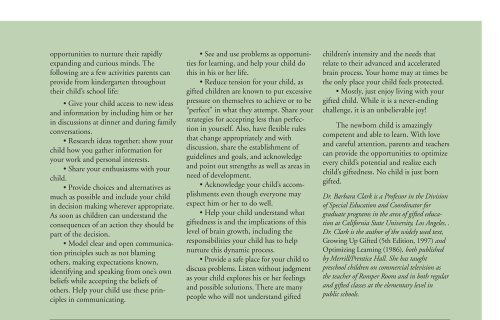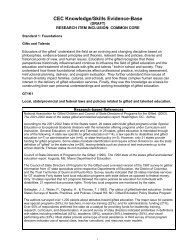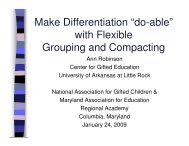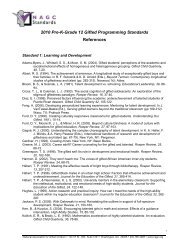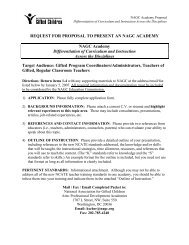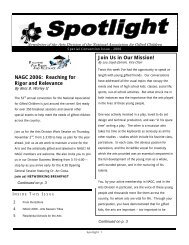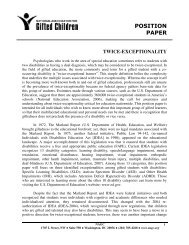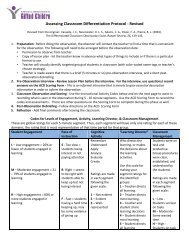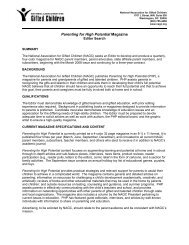No Child is Just Born Gifted - NAGC
No Child is Just Born Gifted - NAGC
No Child is Just Born Gifted - NAGC
You also want an ePaper? Increase the reach of your titles
YUMPU automatically turns print PDFs into web optimized ePapers that Google loves.
opportunities to nurture their rapidlyexpanding and curious minds. Thefollowing are a few activities parents canprovide from kindergarten throughouttheir child’s school life:• Give your child access to new ideasand information by including him or herin d<strong>is</strong>cussions at dinner and during familyconversations.• Research ideas together; show yourchild how you gather information foryour work and personal interests.• Share your enthusiasms with yourchild.• Provide choices and alternatives asmuch as possible and include your childin dec<strong>is</strong>ion making wherever appropriate.As soon as children can understand theconsequences of an action they should bepart of the dec<strong>is</strong>ion.• Model clear and open communicationprinciples such as not blamingothers, making expectations known,identifying and speaking from one’s ownbeliefs while accepting the beliefs ofothers. Help your child use these principlesin communicating.• See and use problems as opportunitiesfor learning, and help your child doth<strong>is</strong> in h<strong>is</strong> or her life.• Reduce tension for your child, asgifted children are known to put excessivepressure on themselves to achieve or to be“perfect” in what they attempt. Share yourstrategies for accepting less than perfectionin yourself. Also, have flexible rulesthat change appropriately and withd<strong>is</strong>cussion, share the establ<strong>is</strong>hment ofguidelines and goals, and acknowledgeand point out strengths as well as areas inneed of development.• Acknowledge your child’s accompl<strong>is</strong>hmentseven though everyone mayexpect him or her to do well.• Help your child understand whatgiftedness <strong>is</strong> and the implications of th<strong>is</strong>level of brain growth, including theresponsibilities your child has to helpnurture th<strong>is</strong> dynamic process.• Provide a safe place for your child tod<strong>is</strong>cuss problems. L<strong>is</strong>ten without judgmentas your child explores h<strong>is</strong> or her feelingsand possible solutions. There are manypeople who will not understand giftedchildren’s intensity and the needs thatrelate to their advanced and acceleratedbrain process. Your home may at times bethe only place your child feels protected.• Mostly, just enjoy living with yourgifted child. While it <strong>is</strong> a never-endingchallenge, it <strong>is</strong> an unbelievable joy!The newborn child <strong>is</strong> amazinglycompetent and able to learn. With loveand careful attention, parents and teacherscan provide the opportunities to optimizeevery child’s potential and realize eachchild’s giftedness. <strong>No</strong> child <strong>is</strong> just borngifted.Dr. Barbara Clark <strong>is</strong> a Professor in the Div<strong>is</strong>ionof Special Education and Coordinator forgraduate programs in the area of gifted educationat California State University, Los Angeles, .Dr. Clark <strong>is</strong> the author of the widely used text,Growing Up <strong>Gifted</strong> (5th Edition, 1997) andOptimizing Learning (1986), both publ<strong>is</strong>hedby Merrill/Prentice Hall. She has taughtpreschool children on commercial telev<strong>is</strong>ion asthe teacher of Romper Room and in both regularand gifted classes at the elementary level inpublic schools.


